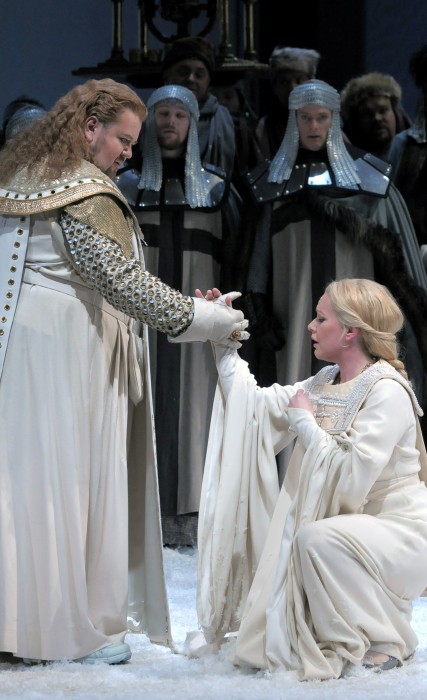A knight to remember: Botha leads a magnificent cast in Lyric Opera’s “Lohengrin”
There are a myriad of reasons why Lohengrin should not work for a modern audience. Stiff tableaux-like action and long static scenes dominate this uneasy combination of romantic fairy tale and symbolic fable of a mysterious knight who saves an innocent threatened maiden. Imbued with Christian mysticism and an impenetrable nexus of Norse and German mythology, the noble, tragic hero serves as a stand-in for Wagner at a time when the composer was besieged by enemies and felt his music was largely unappreciated.
Yet Lohengrin is the first work of Wagner’s artistic maturity, a rich and sumptuous score with a complexity of interlocking motives and chromatic audacity that point the way forward for Tristan und Isolde and the Ring operas to come.
The Lyric Opera of Chicago opened its first production of Lohengrin in three decades Friday night at the Civic Opera House. And despite being handicapped by a dated, visually drab staging, the company has fielded a superb cast of Wagnerians—no mean feat these days—that served the composer’s music extraordinarily well and made for as majestic a night of Wagner singing as one is likely to hear anywhere.
As the title 10th-century knight who rescues the unjustly accused Elsa, the rotund Johan Botha may not cut a physically imposing figure, but vocally the South African tenor showed all the power and dramatic heft necessary for this tortuous role.
Possessed of a big, vibrant tenor, Botha was up to all of this role’s considerable demands—dignified and heroic in the court ensembles, sensitive and nuanced in his intimate scenes with Elsa, and showing a toughness—and some impressive sword moves—in his confrontations with the villainous Friedrich. Botha seemed to tire a bit at the end of the long evening but still managed to rise to his big moments in the final scene, bringing just the right mix of sadness, vulnerability and determined strength to In fernem Land and Mein lieber Schwan.
It was great to have the gifted Emily Magee back at the Lyric Opera as Elsa, the former Ryan Opera Center alumna’s first company appearance in 13 years. The American soprano possesses the requisite vocal purity and luminous expression for the innocent Elsa, some thinness at the very top apart. While always engaged in the action, dramatically her Elsa seemed a work in progress, McGee at times overdoing the neurotic qualities and making Elsa seem more unhinged than spiritually ecstatic.
This has been a wonderful year for villains at the Lyric Opera and the current production offers two terrific ones. As the evil Friedrich of Telramund, Greer Grimsley was impressive in doing his snarling nasty, yet the American bass-baritone also sang with a surprising lyrical quality and ease of production in his deep and imposing voice.
As Ortrud, his wife and partner in malicious co-dependency, Michaela Schuster made a strikingly successful company debut. The German singer brought an intensity of focus to the manipulative pagan character—who is much stronger than her weak-willed husband—and sang with a luxuriant mezzo-soprano voice in her long Act 2 scene with Elsa.
Georg Zeppenfeld was a sonorous and dignified King, Lester Lynch, last seen in Porgy and Bess, a notably strong-voiced Herald, completing a cast without a single weak link.
The same couldn’t be said for the chintzy-looking Minimalism of John Napier’s sets. The traditional production wasn’t new when the Lyric last presented Lohengrin in 1980 and now this descendant of Wieland Wagner’s postwar stripped-down style looks decidedly aged. Uncluttered it may be, but the mostly bare stage and lack of scenery looks cheesy with the scrim for most of Act 1 making the action too obscure. Apart from swordfights that needed more speed and intensity, director Elijah Moshinsky moved his characters naturally and believably, avoiding visual ennui in the static action. But where was the swan?
Also while it’s clear the company is trying to save money where it can, couldn’t they have found some Malabar costumes for the four excellent onstage trumpeters? Clad in modern black and positioned just outside the action, the brass players looked like a group of jazz sidemen who just happened to drop into 10th-century Brabant for a gig.
Apart from being too quick on the trigger at the climactic moment when Lohengrin reveals his identity, Sir Andrew Davis led an alert, flowing and rhapsodic account of Wagner’s extraordinary score. At times, Davis’s penchant for fleet tempos sacrificed the spiritual element, yet his sense of the long line and musical integrity skirted the occasional musical squareness and Davis drew gleaming and richly responsive playing from the Lyric Opera Orchestra.
There are few things in all opera more sonically thrilling than the massed ensemble scenes in Lohengrin. Kudos to out-going chorusmaster Donald Nally and his singers for their stellar work in achieving such polished and glorious corporate vocalism in music that is just as demanding as that of the principals.
Lohengrin runs through March 8. lyricopera.org; 312-332-2244.
Posted in Performances






Posted Feb 13, 2011 at 10:09 am by Jack
A superb review of a memorable night at the opera. Botha was a thrilling knight and kudos all around for cast and conductor. A show not to miss.
Posted Mar 09, 2011 at 8:40 am by Allegra Williams
LOHEGRIN WAS A THE FIRST OPERA THAT I HJAVE ATTENDEND AND IT WAS NOT WHAT I WAS EXPECTING IN A GOOD MANNER. I EXPECTED TO BE BORED AND SLEEPY ESPECIALLY SINCE THE OPERA WAS NOT I ENGLISH. BUT LOHEGRIN WAS EVERYTHING BUT BORING I CAUGHT MYSELF AT THE EDGE OF MY SEAT KEEPING UP WITH THE SUBTITLES AND THE ACTORS, THE SET WAS BEAUTIFUL.